The Prince - A Study in Expediency
Therefore it is unnecessary for a prince to have all the good qualities I have enumerated, but it is very necessary to appear to have them. And I shall dare to say this also, that to have them and always to observe them is injurious, and that to appear to have them is useful; to appear merciful, faithful, humane, religious, upright, and to be so, but with a mind so framed that should you require not to be so, you may be able and know how to change to the opposite.Through much of the first half of Niccolò Machiavelli's The Prince, I did not understand the reason so much malevolence is associated with the author's name. The first seventeen chapters come across as a detailed guide or manual to being a successful ruler. Machiavelli initially comes across as pretty fair-minded for his time; he gives examples of successful princes, discusses soldiering much in the vein of Sun Tzu (he would later write his own The Art of War), and even admonishes against tyranny. The princes he analyzes are both contemporary and historical, and it makes for an interesting lesson.
Finally, we come to chapter 18, and here the book becomes its own punchline. If we're to take him literally, the Machiavellian way is to appear to be good, and if it's expedient to actually be moral, that's a bonus.
Published in the early 1500s, The Prince is hardly the place one would look for ideas of a government "by the people, for the people," and the advice it contains is from the vista of a single power-holder chiefly interested in self-preservation. The book and its author have been reviled throughout history, and today opinions remain mixed; some readers even find the entire thing a satire. I was not overly surprised at his sometimes cold-blooded maxims, because these kinds of political decisions are not unusual and even from the nations which claim to be most morally upright. While that doesn't make it right, I suppose modern readers are just more immunized to the ideas. And, while "Machiavellian" has become a fancy euphemism for "bad," I feel that is almost giving him too much credit - there's no novelty in realpolitik; in fact, it's as groundbreaking as "me first."
This is one of those rare books which I would like to re-read with an annotated edition. A lot of the historical references were quite honestly unfamiliar to me, and so it is hard to come to a complete opinion without that background knowledge. I recommend it to anyone wanting to know what the hype is about, but don't expect to learn something new, only to be reminded of some of our less admirable history.
3 out of 5 stars. (Side note - if you're interested in how I choose a rating for a book, I have a new episode about this very topic on Classics Considered).




Comments